Overview
To prepare for leaving a stable job for entrepreneurship, individuals should focus on developing an entrepreneurial mindset, financial stability, networking, skill development, and crafting a solid business plan. The article emphasizes that these strategies, supported by statistics and expert insights, are essential for navigating the uncertainties of entrepreneurship and increasing the likelihood of success in a competitive landscape.
Introduction
Embarking on the entrepreneurial journey is a bold and transformative endeavor, one that requires more than just a great idea. It demands a comprehensive shift in mindset, financial preparation, and a robust network of support. As aspiring business owners navigate the complexities of launching their ventures, they must cultivate resilience and adaptability while embracing the uncertainties that accompany this path.
From establishing a financial safety net to honing essential skills and crafting a detailed business plan, each step is crucial in laying the foundation for success. This article delves into the multifaceted aspects of entrepreneurship, offering practical guidance on how to overcome common challenges and thrive in a competitive landscape.
Whether it’s through networking, skill development, or creating a strategic roadmap, the insights shared here aim to empower future entrepreneurs to take control of their destinies and build sustainable businesses.
Embracing the Entrepreneurial Mindset
Transitioning into entrepreneurship necessitates a profound transformation in mindset. Aspiring entrepreneurs must cultivate resilience and adaptability while embracing the inherent uncertainties of this path. This often means exploring ways to prepare to leave a stable job for entrepreneurship to adopt a more proactive problem-solving approach.
Participating in self-reflection can be invaluable; think about journaling your experiences and difficulties to better comprehend your motivations and fears. Establishing ambitious yet attainable objectives will assist you in maintaining focus and direction, enabling you to take charge of your destiny through ownership education. Being around similar individuals creates a supportive atmosphere that promotes growth, and engaging in coaching can clarify your entrepreneurial objectives and assist you in navigating obstacles effectively.
Moreover, immersing yourself in literature on entrepreneurship, such as ‘Your Career Revolution’ and ‘Your Career 2.0: A Survival Guide for The Battered Career Syndrome and Investor Syndrome,’ can offer fresh insights and inspiration for your journey.
Recent statistics highlight that 18.3% of businesses in the U.S. are minority-owned, illustrating a growing diversity in the entrepreneurial landscape. This shift highlights the significance of strong support systems, especially for minority entrepreneurs who frequently encounter distinct obstacles. Dr. Stephen Spinelli Jr., President of Babson College, states,
There is a clear call for enhanced support for entrepreneurship, which necessitates increased investment in education, robust mentorship programs, and strategic collaborations with academic institutions fostering an entrepreneurial mindset.
Additionally, it’s noteworthy that women perceive entrepreneurship as a viable career choice at a rate of 78%, slightly higher than the 74% for men, indicating a shift in gender dynamics that also calls for increased support systems for female entrepreneurs.
However, disparities persist, as evidenced by the fact that 73% of small startups are owned by men and women received only 2.3% of venture capital in 2020. As you embark on this journey, remember that resilience and adaptability are not merely traits but essential skills and ways to prepare to leave a stable job for entrepreneurship that significantly impact success rates. By embracing these qualities, along with the support systems and educational resources available, you will be better prepared for the challenges ahead and empowered to thrive in a competitive environment.
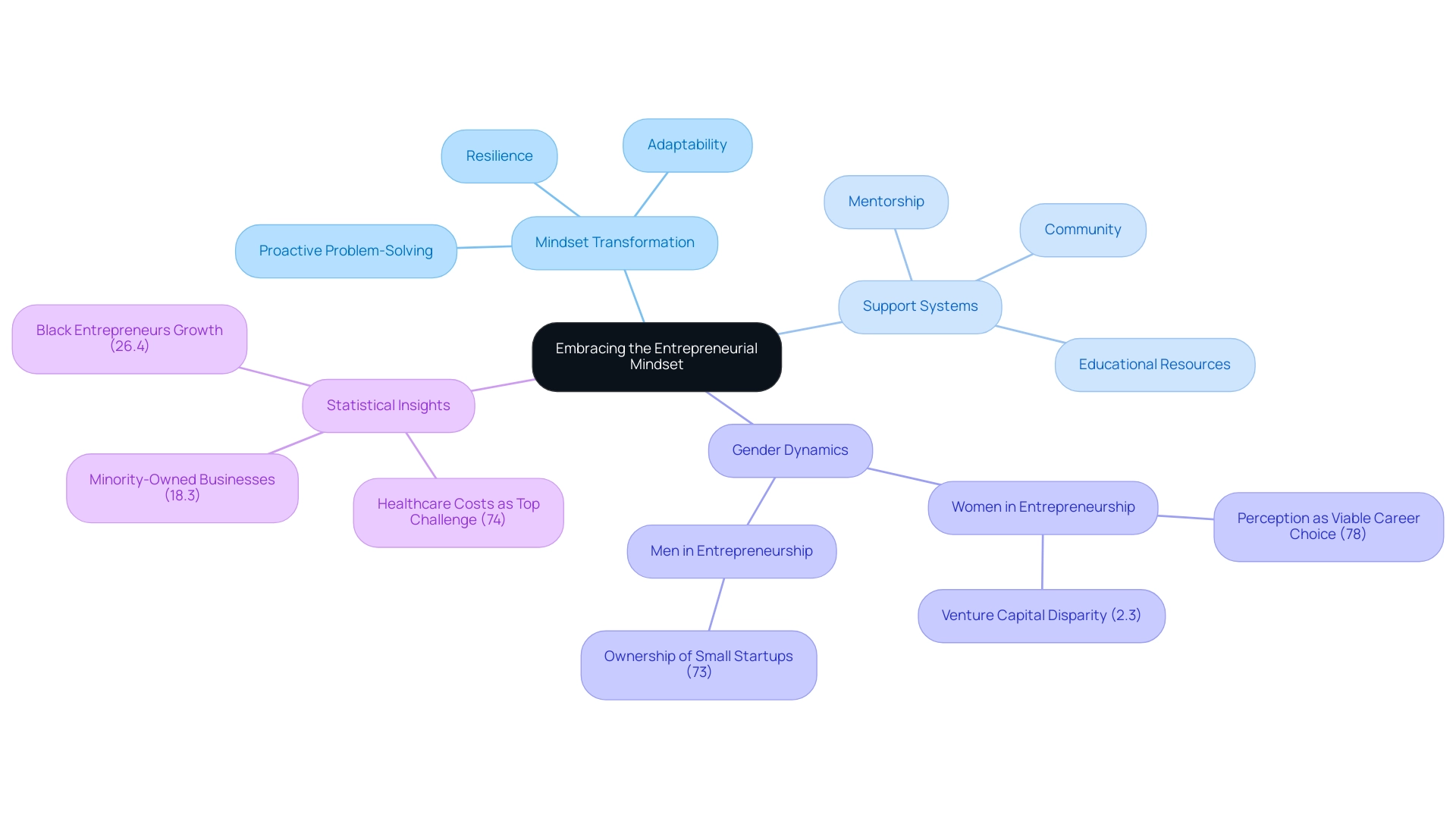
Financial Preparation: Building a Safety Net
Before exploring ways to prepare to leave a stable job for entrepreneurship, it’s crucial to establish a strong safety net. When considering ways to prepare to leave a stable job for entrepreneurship, aim to save at least six months’ worth of living expenses; this cushion can prove invaluable during the often unpredictable initial stages of starting a venture. Considering that average startup expenses are approximately $40,000 in the initial year, having a monetary buffer can greatly reduce stress.
Additionally, exploring ways to prepare to leave a stable job for entrepreneurship, such as alternative income sources or part-time work, can provide further stability as you navigate your new venture. Creating a thorough budget that includes both personal and operational costs is one of the ways to prepare to leave a stable job for entrepreneurship, which is essential for efficient resource management during this transition. It is also important to explore ways to prepare to leave a stable job for entrepreneurship before launching, such as registering your enterprise and obtaining the required licenses.
The SBA can assist with financial estimates and provide free counseling for new entrepreneurs, which are important ways to prepare to leave a stable job for entrepreneurship. Moreover, considering various financing options, as discussed in the case study ‘Additional Considerations for Financing,’ can offer insights into how to maintain ownership while funding your enterprise. As Deborah Findling, Executive Managing Editor at Square, points out, many small entrepreneurs struggle with work-life balance, as evidenced by a study indicating that only 57% take vacations, and of those, 67% remain connected to work daily.
Therefore, financial preparation involves more than just figures; it’s about exploring ways to prepare to leave a stable job for entrepreneurship, ensuring you have the ability to excel personally and professionally as you develop your venture.
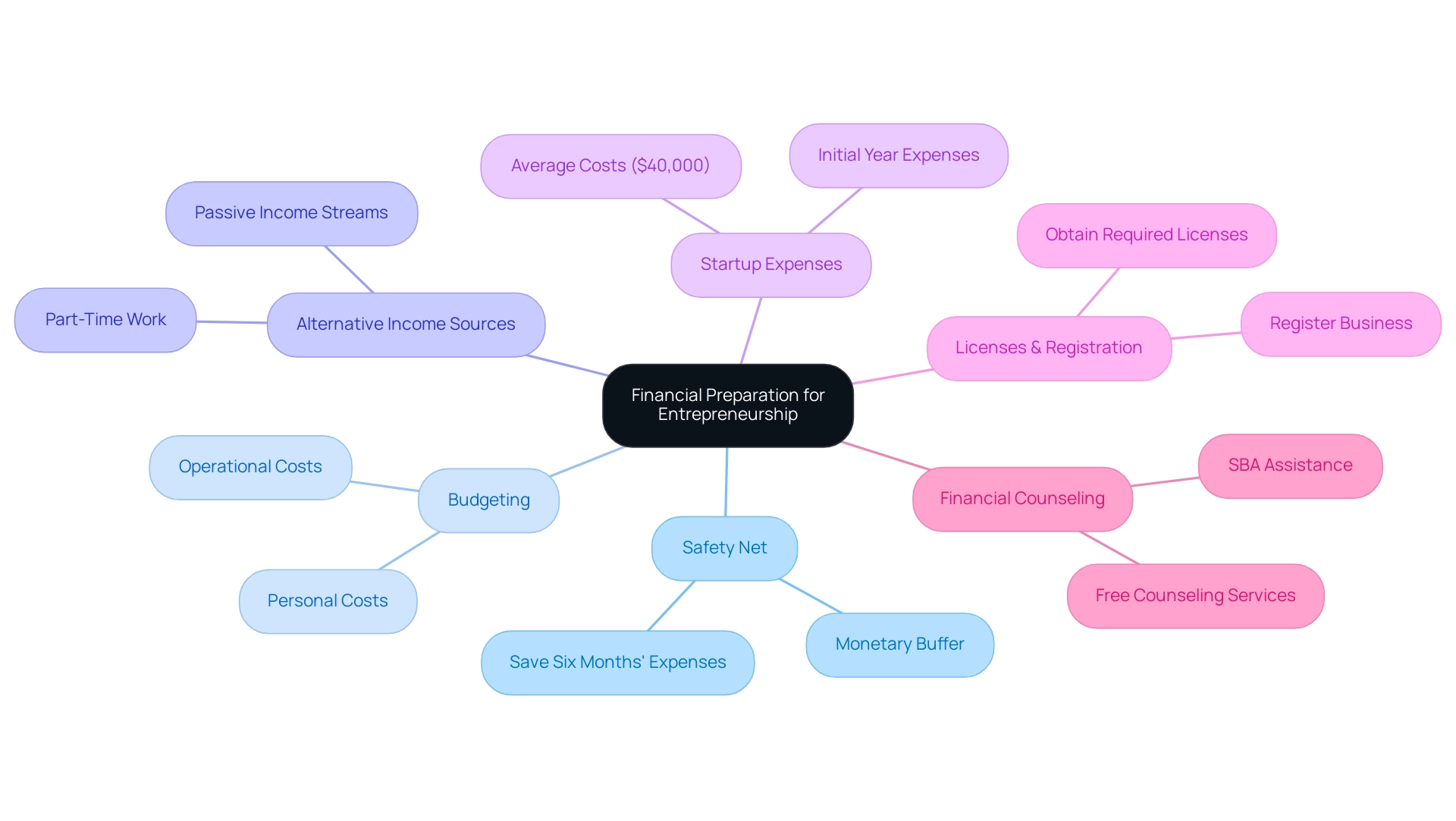
Networking: Cultivating Valuable Connections
For aspiring entrepreneurs, cultivating a robust professional network is one of the important ways to preparing to leave a stable job for entrepreneurship, as it is not just beneficial—it’s essential. Start by actively participating in industry events, such as the International Business Ownership Expo happening from May 30th to June 1st, 2024, in New York City. This premier franchise event connects aspiring entrepreneurs with over 300 franchise brands and industry experts, providing invaluable resources for your entrepreneurial journey.
Joining local business groups that align with your interests further enhances your networking efforts. Additionally, utilize social media platforms like LinkedIn to forge connections with professionals in your field. Don’t shy away from reaching out to former colleagues, mentors, and industry leaders; their advice and support are crucial in navigating career challenges and overcoming the limitations of conventional career paths.
Establishing relationships can yield opportunities for collaborations, referrals, and insights, which are essential ways to preparing to leave a stable job for entrepreneurship and greatly enrich your entrepreneurial journey. As Ryan Bradshaw notes, online networking offers several advantages:
- It saves time (92%)
- Reduces costs (88%)
- Provides more flexibility in location and timing (76%)
Furthermore, statistics show that 18% of workers applied for their current position through friends or former colleagues, highlighting the practical benefits of networking in job applications.
It’s also noteworthy that 7% of job applications are referrals, which account for a significant 40% of hires, underscoring the effectiveness of networking in securing employment opportunities. Ultimately, remember that effective networking is one of the key ways to preparing to leave a stable job for entrepreneurship, as it transcends mere transactional interactions and focuses on fostering mutually beneficial relationships that can lead to shared success. A case study titled ‘Opportunities from Networking’ illustrates this point, revealing that 70% of networking interactions lead to potential new ventures, with successful outcomes including enhanced economic independence and empowerment for those who actively engage in building their networks.
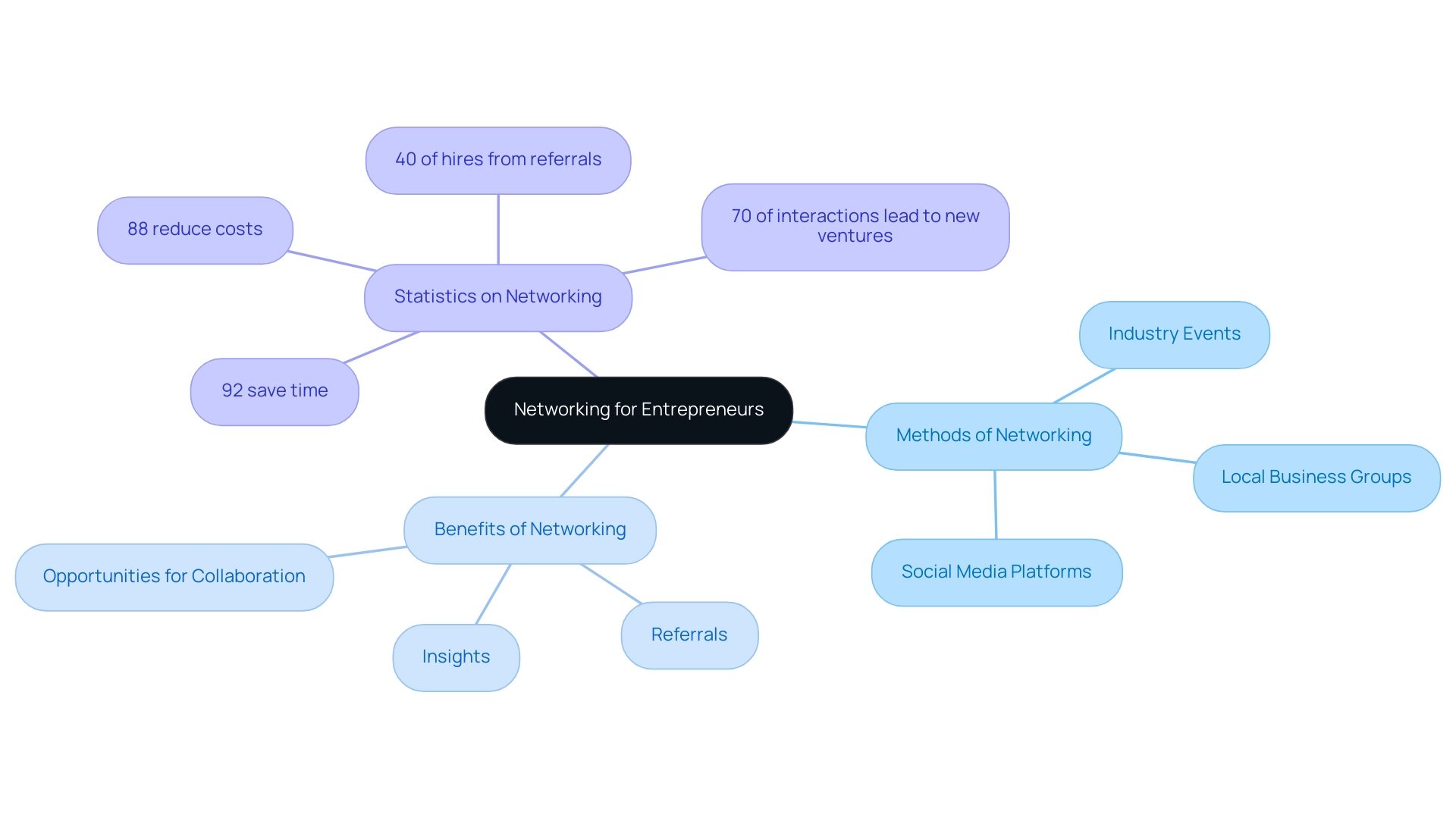
Skill Development: Equipping Yourself for Success
The journey of successful entrepreneurs is often marked by a commitment to lifelong learning and adaptability. As the landscape of business evolves, identifying and refining the abilities essential for your enterprise becomes imperative. In 2024, aspiring entrepreneurs should concentrate on essential abilities such as:
- Identifying opportunities
- Developing innovative solutions
- Managing change
Alongside hard competencies like:
- Financial management
- Marketing
And crucial soft attributes including:
- Communication
- Leadership
Resources for ability enhancement abound, ranging from online courses and workshops to mentorship opportunities within your industry. Significantly, recent statistics show that 83% of small enterprise owners earn under $100,000 each year, with 30% forgoing salaries entirely, demonstrating the economic pressures that require expertise mastery and the significance of community involvement. These economic obstacles highlight the need for entrepreneurs to consider ways to prepare to leave a stable job for entrepreneurship in order to enhance their capabilities to navigate these difficulties effectively, especially in a declining job market where employability can be uncertain.
As noted in the case study titled ‘Conclusion on Entrepreneurship,’ while entrepreneurship offers freedom, purpose, and the chance to leave a legacy, it also involves significant risks that can lead to failure. Indra Nooyi, former CEO of PepsiCo, wisely stated,
Just because you are CEO, don’t think you have landed. You must continually increase your learning, the way you think, and the way you approach the organization.
By prioritizing skill development and leveraging transferable skills, you will not only enhance your ability to navigate the challenges of entrepreneurship but also discover ways to prepare to leave a stable job for entrepreneurship, ultimately paving the way for your venture’s success and economic freedom while mitigating risks and enhancing wealth-building opportunities.
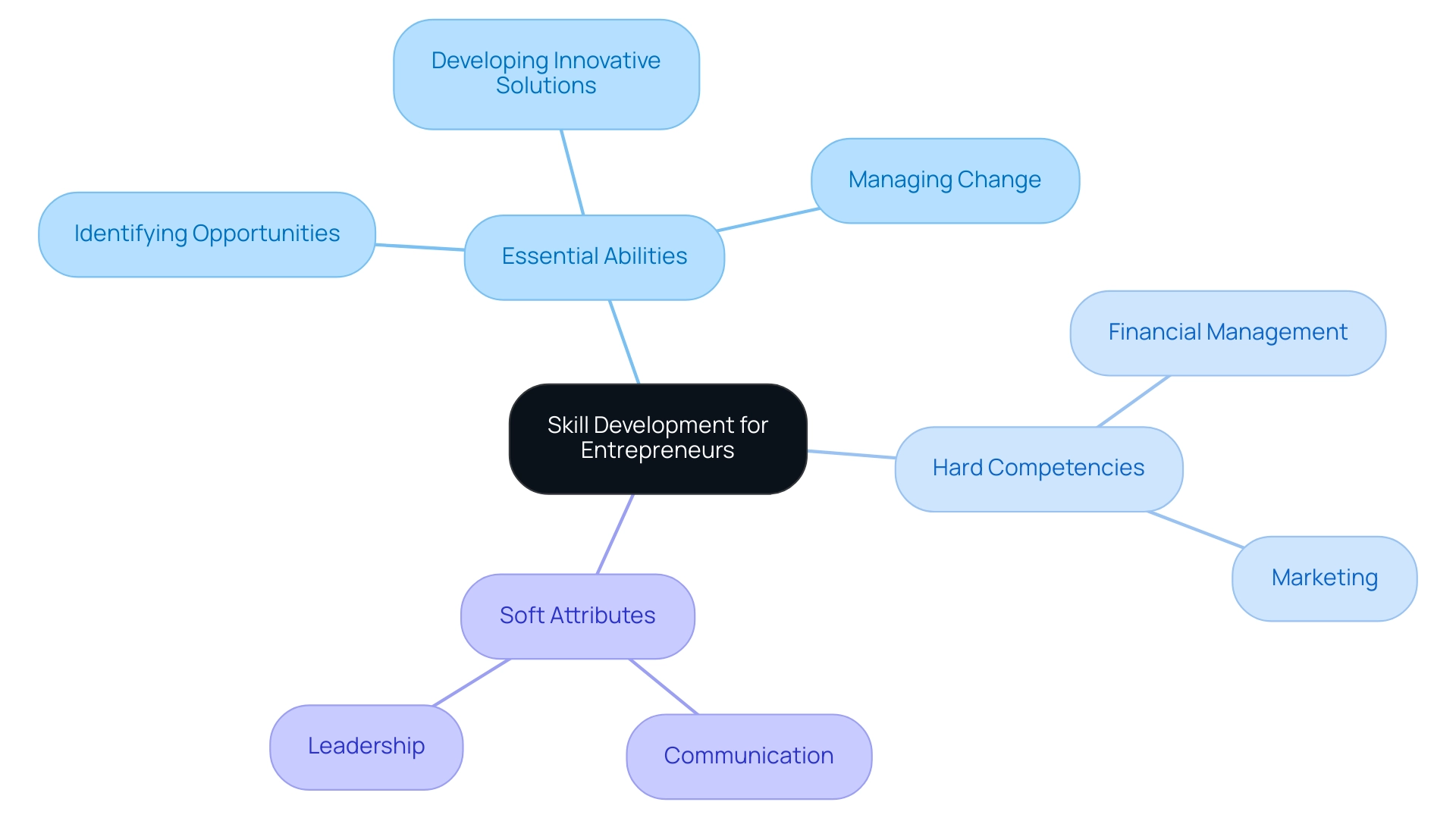
Crafting a Business Plan: Your Roadmap to Success
Developing a comprehensive strategy is one of the crucial ways to preparing to leave a stable job for entrepreneurship. A well-structured plan is one of the essential ways to preparing to leave a stable job for entrepreneurship and typically includes several key components:
- An executive summary
- A detailed description of your enterprise
- An in-depth market analysis
- An organizational structure outline
- Financial projections
This document acts as both a roadmap and a persuasive tool for exploring ways to preparing to leave a stable job for entrepreneurship by securing funding from investors or banks.
In fact, 71 percent of fast-growing companies have strategic plans in place, reinforcing their importance in achieving success. Research indicates that entrepreneurs who create formal plans are 152% more likely to launch their ventures and 129% more likely to expand beyond the startup phase. Moreover, a study conducted at the University of Oregon underscores this point: enterprises with a solid plan are significantly more likely to secure funding compared to their counterparts without one.
According to 2014 research, 70% of venture capitalists believe that having a documented plan is essential for obtaining monetary support. Therefore, take the time to conduct thorough market research and analyze your competition, ensuring your financial forecasts are realistic. Frequently revisiting and updating your plan is essential to stay aligned with market dynamics and to maintain adaptability in the ever-evolving landscape.
Many industry experts agree that one of the important ways to prepare for entrepreneurship is by creating a well-crafted business plan, which clarifies your vision and helps identify potential challenges and opportunities.
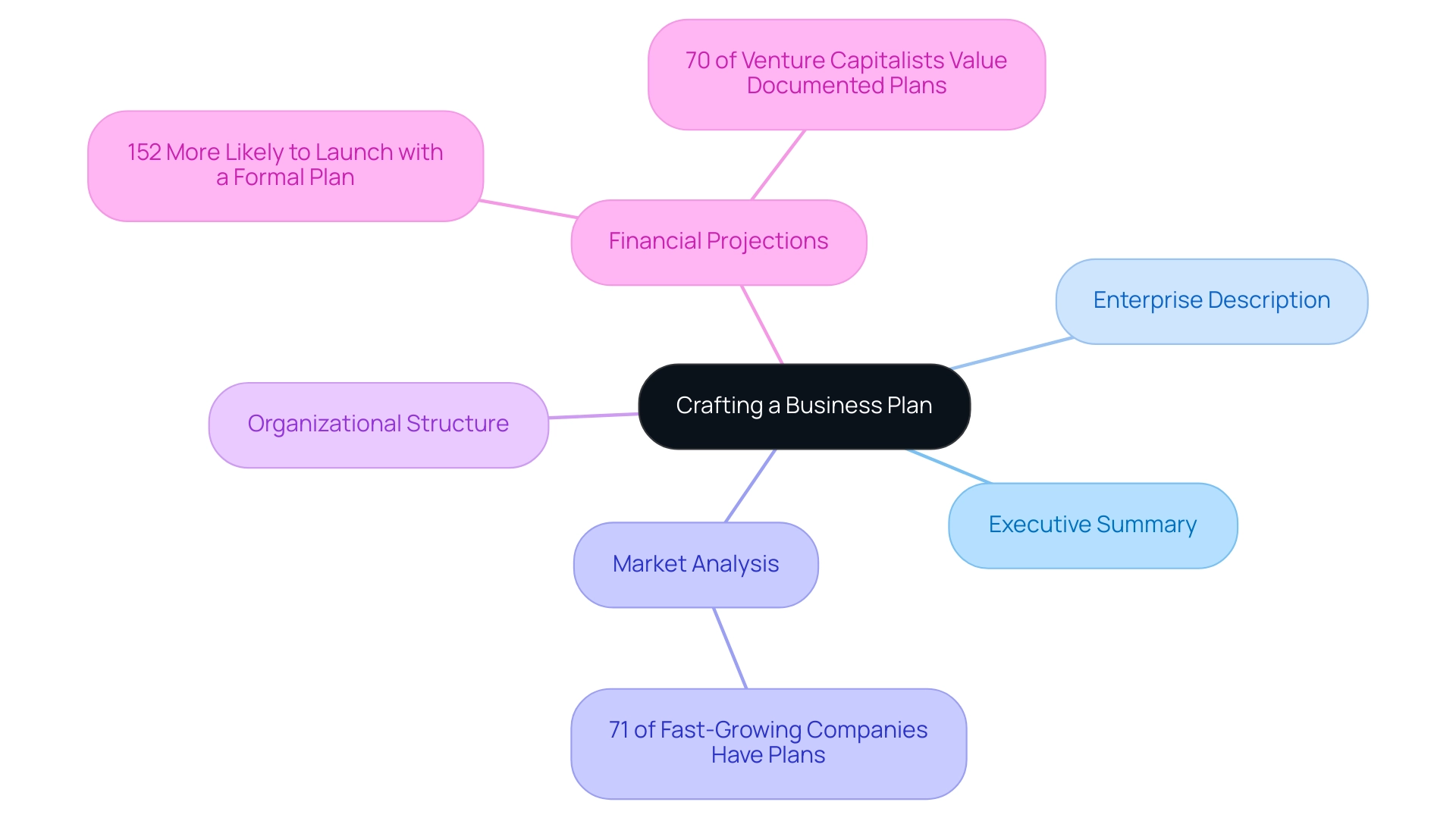
Conclusion
The entrepreneurial journey is undeniably challenging, yet it is also filled with immense potential for growth and success. Key elements such as:
- Cultivating the right mindset
- Establishing a financial safety net
- Building a supportive network
are crucial for aspiring business owners. Embracing resilience and adaptability allows individuals to navigate the uncertainties of entrepreneurship, while thorough financial preparation provides a buffer against the unpredictable nature of starting a business.
Networking emerges as an indispensable tool in this journey, enabling entrepreneurs to forge valuable connections that can lead to collaborations and insights. Additionally, continuous skill development ensures that aspiring entrepreneurs remain competitive in an evolving landscape. Crafting a comprehensive business plan serves not only as a roadmap for the venture but also as a vital resource for securing funding and guiding strategic decisions.
Ultimately, the path to entrepreneurship requires a blend of preparation, support, and ongoing learning. By embracing these principles, aspiring business owners can significantly enhance their chances of success and build sustainable enterprises that contribute positively to their communities. The journey may be daunting, but with the right mindset and resources, it can lead to fulfilling and impactful outcomes.
Frequently Asked Questions
What mindset changes are necessary for transitioning into entrepreneurship?
Aspiring entrepreneurs need to cultivate resilience and adaptability while embracing uncertainties. This involves preparing to leave a stable job and adopting a proactive problem-solving approach.
How can self-reflection help in the transition to entrepreneurship?
Self-reflection, such as journaling experiences and difficulties, can help individuals understand their motivations and fears, which is crucial for setting ambitious yet attainable goals.
What role does support from others play in entrepreneurship?
Being around like-minded individuals creates a supportive atmosphere that promotes growth. Engaging in coaching can also clarify entrepreneurial objectives and help navigate challenges.
What resources are recommended for aspiring entrepreneurs?
Immersing oneself in literature on entrepreneurship, such as ‘Your Career Revolution’ and ‘Your Career 2.0,’ can provide fresh insights and inspiration.
What are the current statistics regarding minority-owned businesses in the U.S.?
Approximately 18.3% of businesses in the U.S. are minority-owned, indicating a growing diversity in the entrepreneurial landscape.
What challenges do minority entrepreneurs face?
Minority entrepreneurs often encounter unique obstacles, highlighting the need for strong support systems and increased investment in education and mentorship programs.
How do gender dynamics play a role in entrepreneurship?
Women perceive entrepreneurship as a viable career choice at a rate of 78%, compared to 74% for men. However, disparities exist, with 73% of small startups owned by men and women receiving only 2.3% of venture capital in 2020.
What financial preparations should be made before leaving a stable job for entrepreneurship?
It is advisable to save at least six months’ worth of living expenses, explore alternative income sources, create a detailed budget, and ensure the registration of the enterprise and necessary licenses.
What is the average startup cost for new businesses?
The average startup expenses are approximately $40,000 in the initial year, making a financial cushion essential for reducing stress during the startup phase.
How can the SBA assist new entrepreneurs?
The SBA can provide financial estimates and free counseling, which are important resources for new entrepreneurs as they prepare to leave stable jobs.
What work-life balance challenges do small entrepreneurs face?
Many small entrepreneurs struggle with work-life balance; a study indicates that only 57% take vacations, and of those, 67% remain connected to work daily.


